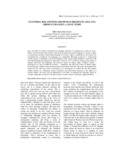Cultural relativism and human rights in Ama Ata Aidoo’s changes: a love story
Date
2016-10Publisher
© 2016 Published by BRAC UniversityAuthor
Ibne Ismail, Md. IshratMetadata
Show full item recordCitation
Ibne Ismail , M. I. (2016). Cultural relativism and human rights in Ama Ata Aidoo’s changes: a love story. BRAC University Journal, 11(01), 17–22.Abstract
Ama Ata Aidoo’s Changes documents the changing situations of contemporary women in Accra, Ghana. The novel deals with an idea of the Western-styled universalist language of women’s rights, a concept that constructs certain understandings of women’s rights as applicable to all women. The protagonist Esi’s preference for polygamy as a potentially liberating system for a professional woman appears to challenge a universal thought of what women rights should be, especially with the understanding that polygamy is patriarchal. However, Esi’s preference brings up the notion of cultural relativism and challenges the universal claims of human rights. Cultural realities – developed over ages in different societies – complicate any universal vision of human rights. Considering the conflicts between universalism and cultural relativism, this paper investigates how Aidoo uses Esi (after her choice of polygamy over monogamy) to confirm the fact that cultural realities relative to a Ghanaian society complicate any universalist approach to the rights of a woman. Hence, the novel can be interpreted as an effort to question the totalizing claims of women’s rights that are based on Western notions of what women’s and human rights should be.

